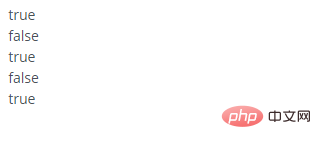Java에서 equals() 메소드는 한 객체가 다른 객체와 동일한지 여부를 감지하는 데 사용됩니다. 구문은 "Object.equals(Object2)"입니다. 이 메소드는 두 객체가 동일한 참조를 갖는지 여부를 결정합니다. 동일한 참조가 있으면 동일해야 합니다. equals() 메소드는 기본 데이터 유형의 변수에 대해 작동할 수 없습니다.

이 튜토리얼의 운영 환경: windows7 시스템, java8 버전, DELL G3 컴퓨터.
java equals() 메소드는 객체가 동일한지 확인합니다.
equals 메소드는 한 객체가 다른 객체와 동일한지 여부를 감지하는 데 사용됩니다. 참고: equals 메소드는 기본 데이터 유형의 변수에 작용할 수 없습니다. Object 클래스에서 이 메소드는 두 객체가 동일한 참조를 가지고 있는지 여부를 확인합니다. 두 객체가 동일한 참조를 가지고 있으면 동일해야 합니다.
이러한 관점에서 기본 작업으로 설정하는 것이 합리적입니다. 그러나 대부분의 클래스에서는 이 판단이 의미가 없습니다. 예를 들어 두 개의 PrintStream을 이런 방식으로 비교하는 것은 전혀 의미가 없습니다. 그러나 두 객체의 상태가 동일한지 확인해야 하는 경우가 종종 있습니다. 두 객체의 상태가 동일하면 두 객체가 동일한 것으로 간주됩니다. 따라서 사용자 정의 클래스에서는 같음 비교를 재정의해야 합니다. 다음은 완벽한 equals() 메서드 작성을 위한 제안 사항입니다. (1) 나중에 other라는 변수로 변환해야 하는 명시적 매개 변수 otherObject의 이름을 지정합니다. (2) this와 otherObject가 동일한지 확인하세요. 참조 개체:if(this==otherObject) return true;
if(otherObject==null) return false;
if(getClass()!=otherObject.getClass()) return false;
if(!(otherObject instanceof ClassName)) return false;
ClassName other=(ClassName)otherObject;
return field1==other.field1&&field2.equals(other.field2)
String a = "abc"; String b = "abc"; String c = new String("abc"); String d = new String("abc"); System.out.println(a == b); // true 因为JAVA中字符串常量是共享的,只有一个拷贝 System.out.println(a == c); // false a和c属于2个不同的对象 System.out.println(a.equals(c)); // true 由于String对象的equals方法比较的是对象中的值,所以返回true。(和Object的equals方法不同) System.out.println(c==d); // false c和d虽然对象内的值相同,但属于2个不同的对象,所以不相等 System.out.println(c.equals(d)); // true
간단히 말하면 문자열 상수를 비교할 때 문자열 개체의 값을 비교하려면 같음과 동일한 결과를 반환합니다.
package chapter05.EqualsTest; import java.util.*; public class EqualsTest { public static void main(String[] args) { Employee alice1 = new Employee("Alice Adams", 75000, 1987, 12, 15); Employee alice2 = alice1; // reference the same object Employee alice3 = new Employee("Alice Adams", 75000, 1987, 12, 15); Employee bob = new Employee("Bob Brandson", 50000, 1989, 10, 1); System.out.println("alice1 == alice2: " + (alice1 == alice2)); System.out.println("alice1 == alice3: " + (alice1 == alice3)); System.out.println("alice1.equals(alice3): " + (alice1.equals(alice3))); System.out.println("alice1.equals(bob): " + (alice1.equals(bob))); System.out.println(bob.toString()); } } class Employee { public Employee(String n, double s, int year, int month, int day) { name = n; salary = s; GregorianCalendar calendar = new GregorianCalendar(year, month, day); hireDay = calendar.getTime(); } public String getName() { return name; } public double getSalary() { return salary; } public Date getHireDay() { return hireDay; } public void raiseSalary(double byPercent) { double raise = salary * byPercent / 100; salary += raise; } @Override public boolean equals(Object otherObject) { // a quick test to see if the objects are identical if (this == otherObject) return true; // must return false if the explicit parameter is null if (otherObject == null) return false; // if the classed don't match,they can't be equal if (getClass() != otherObject.getClass()) return false; // now we know otherObject is a non-null Employee Employee other = (Employee) otherObject; // test whether the fields hava identical values return name.equals(other.name) && salary == other.salary && hireDay.equals(other.hireDay); } @Override public int hashCode() { return 7 * name.hashCode() + 11 * new Double(salary).hashCode() + 13 * hireDay.hashCode(); } @Override public String toString() { return getClass().getName() + "[name=" + name + ",salary=" + salary + ",hireDay=" + hireDay + "]"; } private String name; private double salary; private Date hireDay; } class Manager extends Employee { public Manager(String n, double s, int year, int month, int day) { super(n, s, year, month, day); bouns = 0; } @Override public double getSalary() { double baseSalary = super.getSalary(); return baseSalary + bouns; } public void setBouns(double b) { bouns = b; } @Override public boolean equals(Object otherObject) { if (!super.equals(otherObject)) return false; Manager other = (Manager) otherObject; // super equals checked that this and other belong to the same class return bouns == other.bouns; } @Override public int hashCode() { return super.hashCode() + 17 * new Double(bouns).hashCode(); } @Override public String toString() { return super.toString() + "[bouns=" + bouns + "]"; } private double bouns; }
== : 이 기능은 두 개체의 주소가 동일한지 확인하는 것입니다. 즉, 두 개체가 동일한 개체인지 여부를 확인합니다.
import java.util.*; import java.lang.Comparable; /** * @desc equals()的测试程序。 */ public class EqualsTest3{ public static void main(String[] args) { // 新建2个相同内容的Person对象, // 再用equals比较它们是否相等 Person p1 = new Person("eee", 100); Person p2 = new Person("eee", 100); System.out.printf("p1.equals(p2) : %s\n", p1.equals(p2)); System.out.printf("p1==p2 : %s\n", p1==p2); } /** * @desc Person类。 */ private static class Person { int age; String name; public Person(String name, int age) { this.name = name; this.age = age; } public String toString() { return name + " - " +age; } /** * @desc 覆盖equals方法 */ @Override public boolean equals(Object obj){ if(obj == null){ return false; } //如果是同一个对象返回true,反之返回false if(this == obj){ return true; } //判断是否类型相同 if(this.getClass() != obj.getClass()){ return false; } Person person = (Person)obj; return name.equals(person.name) && age==person.age; } } }
p1.equals(p2) : true p1==p2 : false
결과 분석:
In EqualsTest3.java:
(1)p1.equals(p2)
p1.equals(p2)
这是判断p1和p2的内容是否相等。因为Person覆盖equals()方法,而这个equals()是用来判断p1和p2的内容是否相等,恰恰p1和p2的内容又相等;因此,返回true。
(2)p1==p2
(2)p1==p2
더 많은 프로그래밍 관련 지식을 보려면프로그래밍 교육
을 방문하세요! !위 내용은 Java Equals() 메소드를 사용하는 방법의 상세 내용입니다. 자세한 내용은 PHP 중국어 웹사이트의 기타 관련 기사를 참조하세요!